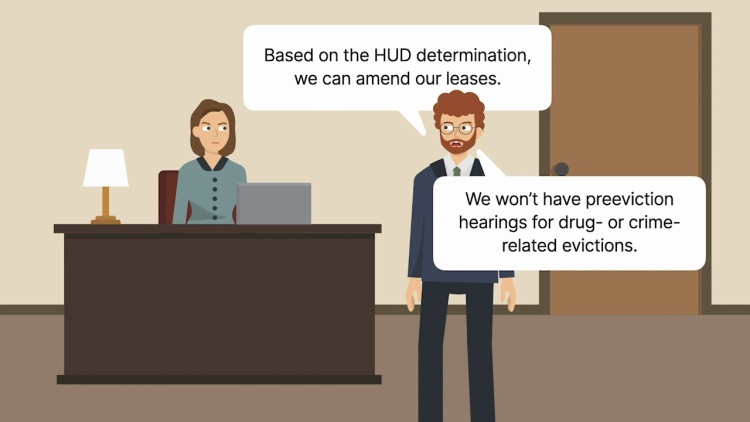Yesler Terrace Community Council v. Cisneros
United States Court of Appeals for the Ninth Circuit
37 F.3d 442 (1994)

- Written by Eric Cervone, LLM
Facts
In the State of Washington, tenants in public-housing projects generally could not be evicted without a grievance hearing before the public-housing authority (PHA) responsible for the project in which they lived. PHAs could, however, be exempted from the grievance procedure for evictions for drug- or crime-related reasons if the U.S. Department of Housing and Urban Development (HUD) determined that the state’s court-eviction procedures complied with due-process requirements. In 1991, HUD determined that Washington’s court-eviction procedure complied with these requirements. In response, several PHAs amended their lease agreements to reflect that they were not required to provide grievance hearings to tenants being evicted for crime-related reasons. In 1992, public-housing tenant Marla Davison was served with an eviction notice informing her that she was not entitled to a grievance hearing because she was being evicted for alleged criminal activity. Representing a class of public-housing tenants, Yesler Terrace Community Council and Eric Bolden (plaintiffs) filed suit against HUD Secretary Henry Cisneros (defendant), seeking injunctive and declaratory relief. The district court granted summary judgment to HUD. The plaintiffs appealed, arguing that because HUD had failed to provide notice and an opportunity for comment before making its determination that Washington’s state-court eviction procedures complied with due process, HUD had violated the Administrative Procedure Act (APA), 5 U.S.C. §§ 551-59, and its own regulations.
Rule of Law
Issue
Holding and Reasoning (Canby, J.)
What to do next…
Here's why 907,000 law students have relied on our case briefs:
- Written by law professors and practitioners, not other law students. 47,100 briefs, keyed to 996 casebooks. Top-notch customer support.
- The right amount of information, includes the facts, issues, rule of law, holding and reasoning, and any concurrences and dissents.
- Access in your classes, works on your mobile and tablet. Massive library of related video lessons and high quality multiple-choice questions.
- Easy to use, uniform format for every case brief. Written in plain English, not in legalese. Our briefs summarize and simplify; they don’t just repeat the court’s language.





